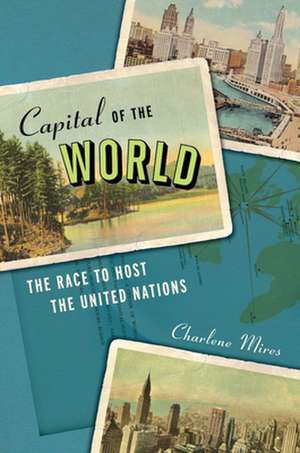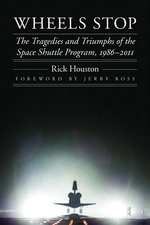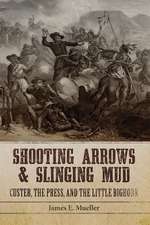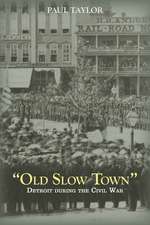Capital of the World – The Race to Host the United Nations
Autor Charlene Miresen Limba Engleză Paperback – 7 apr 2015
| Toate formatele și edițiile | Preț | Express |
|---|---|---|
| Paperback (1) | 245.49 lei 6-8 săpt. | |
| MI – New York University – 7 apr 2015 | 245.49 lei 6-8 săpt. | |
| Hardback (1) | 533.42 lei 6-8 săpt. | |
| MI – New York University – 3 mar 2013 | 533.42 lei 6-8 săpt. |
Preț: 245.49 lei
Nou
Puncte Express: 368
Preț estimativ în valută:
46.98€ • 49.17$ • 39.10£
46.98€ • 49.17$ • 39.10£
Carte tipărită la comandă
Livrare economică 31 martie-14 aprilie
Preluare comenzi: 021 569.72.76
Specificații
ISBN-13: 9781479833757
ISBN-10: 1479833754
Pagini: 328
Dimensiuni: 154 x 228 x 21 mm
Greutate: 0.5 kg
Editura: MI – New York University
ISBN-10: 1479833754
Pagini: 328
Dimensiuni: 154 x 228 x 21 mm
Greutate: 0.5 kg
Editura: MI – New York University
Notă biografică
Recenzii
"Charlene Mires provides a fascinating account of the enthusiastic effort to establish a home for the fledgling United Nations at the end of World War II. She creates a powerful sense of suspense as she describes the intense competition among boosters from New York, Boston, Philadelphia, and even the Black Hills of South Dakota. In lively and elegant prose, from the first sentence to the last, she captures the contradictory visions of the 'Capital of the World' that persisted from beginning to end."-Allan M. Winkler, Distinguished Professor of History, Miami University"Capital of the World is an exceptionally imaginative book that warrants an exceptionally diverse readership. Charlene Mires, a former journalist who recognizes the extraordinary in the ordinary, leverages her skill as a public historian and expertise in material culture to tell the complicated and surprising story of the competition to select the site of UN headquarters. By ascribing meaning to this competition rooted in the defining historical moment in which it took place, Mires offers us an innovative transnational history that provides an unexpected twist to understandings of glocalization."-Richard H. Immerman, Edward J. Buthusiem Family Distinguished Faculty Fellow in History, Temple University"With meticulous research and journalistic verve, Charlene Mires tells an overlooked story about American engagement with the world. Writing in a decade when many Americans worry about their nation's place in the world, Mires reminds us about the excitement that the newly created United Nations generated not only in big eastern cities but also in the heartland of the Middle West and Great Plains. Her fast-moving and always entertaining narrative captures the optimistic spirit of the 'Greatest Generation.'"-Carl Abbott, author of How Cities Won the West: Four Centuries of Urban Change in Western North America"Polls have repeatedly indicated that many New Yorkers wouldnt mind if the UN left their city lock, stock, and barrel, taking its bureaucracy and parking-violating diplomats along. The irony is not lost on Mires, for, as she reveals in her surprising and often amusing work, New York "won the privilege to host the UN after a furious, sometimes sad, and sometimes comical competition with other cities and locales
This is a very readable, entertaining account that is aimed at a general audience." - Booklist
"Mires has tracked down elusive archival sources and forgotten newspaper accounts, uncovering a fascinating chronicle involving countless American politicians, foreign diplomats, and community promoters who participated in the feverish lobbying campaign that at times resembled an Atlantic City beauty contest While plenty of books address the creation of the United Nations, Mires provides an important supplement showing how the idealistic search to establish the physical presence of the fledgling organization gave way to the cold realities of the marketplace. " - Library Journal
"Most know that UN headquarters rest in midtown Manhattan overlooking the East River, but what many do not knowand what Pulitzer-prize winning journalist Morris delivers in this entertaining accountare the improbable twists and turns the organization took in settling on that location. In a refreshing turn, Morris offers insight into 'a period that lies midway between the booster strategies of the nineteenth century and the more intense place marketing and branding efforts of cities around the world in the late twentieth and early twenty-first century,' keeping the story firmly focused on the efforts to determine a location while leaving the more minute details of the UN's formation for other scholars to explain." - Publishers Weekly
"Charlene Mires provides a fascinating account of the enthusiastic effort to establish a home for the fledgling United Nations at the end of World War II. She creates a powerful sense of suspense as she describes the intense competition among boosters from New York, Boston, Philadelphia, and even the Black Hills of South Dakota. In lively and elegant prose, from the first sentence to the last, she captures the contradictory visions of the 'Capital of the World' that persisted from beginning to end."-Allan M. Winkler, Distinguished Professor of History, Miami University "Capital of the World is an exceptionally imaginative book that warrants an exceptionally diverse readership. Charlene Mires, a former journalist who recognizes the extraordinary in the ordinary, leverages her skill as a public historian and expertise in material culture to tell the complicated and surprising story of the competition to select the site of UN headquarters. By ascribing meaning to this competition rooted in the defining historical moment in which it took place, Mires offers us an innovative transnational history that provides an unexpected twist to understandings of glocalization."-Richard H. Immerman, Edward J. Buthusiem Family Distinguished Faculty Fellow in History, Temple University "With meticulous research and journalistic verve, Charlene Mires tells an overlooked story about American engagement with the world. Writing in a decade when many Americans worry about their nation's place in the world, Mires reminds us about the excitement that the newly created United Nations generated not only in big eastern cities but also in the heartland of the Middle West and Great Plains. Her fast-moving and always entertaining narrative captures the optimistic spirit of the 'Greatest Generation.'"-Carl Abbott, author of How Cities Won the West: Four Centuries of Urban Change in Western North America "Polls have repeatedly indicated that many New Yorkers wouldn't mind if the UN left their city lock, stock, and barrel, taking its bureaucracy and parking-violating diplomats along. The irony is not lost on Mires, for, as she reveals in her surprising and often amusing work, New York "won" the privilege to host the UN after a furious, sometimes sad, and sometimes comical competition with other cities and locales...This is a very readable, entertaining account that is aimed at a general audience." - Booklist "Mires has tracked down elusive archival sources and forgotten newspaper accounts, uncovering a fascinating chronicle involving countless American politicians, foreign diplomats, and community promoters who participated in the feverish lobbying campaign that at times resembled an Atlantic City beauty contest...While plenty of books address the creation of the United Nations, Mires provides an important supplement showing how the idealistic search to establish the physical presence of the fledgling organization gave way to the cold realities of the marketplace. " - Library Journal "Most know that UN headquarters rest in midtown Manhattan overlooking the East River, but what many do not know - and what Pulitzer-prize winning journalist Morris delivers in this entertaining account - are the improbable twists and turns the organization took in settling on that location. In a refreshing turn, Morris offers insight into 'a period that lies midway between the booster strategies of the nineteenth century...and the more intense place marketing and branding efforts of cities around the world in the late twentieth and early twenty-first century,' keeping the story firmly focused on the efforts to determine a location while leaving the more minute details of the UN's formation for other scholars to explain." - Publishers Weekly
"Mires has tracked down elusive archival sources and forgotten newspaper accounts, uncovering a fascinating chronicle involving countless American politicians, foreign diplomats, and community promoters who participated in the feverish lobbying campaign that at times resembled an Atlantic City beauty contest While plenty of books address the creation of the United Nations, Mires provides an important supplement showing how the idealistic search to establish the physical presence of the fledgling organization gave way to the cold realities of the marketplace. " - Library Journal
"Most know that UN headquarters rest in midtown Manhattan overlooking the East River, but what many do not knowand what Pulitzer-prize winning journalist Morris delivers in this entertaining accountare the improbable twists and turns the organization took in settling on that location. In a refreshing turn, Morris offers insight into 'a period that lies midway between the booster strategies of the nineteenth century and the more intense place marketing and branding efforts of cities around the world in the late twentieth and early twenty-first century,' keeping the story firmly focused on the efforts to determine a location while leaving the more minute details of the UN's formation for other scholars to explain." - Publishers Weekly
"Charlene Mires provides a fascinating account of the enthusiastic effort to establish a home for the fledgling United Nations at the end of World War II. She creates a powerful sense of suspense as she describes the intense competition among boosters from New York, Boston, Philadelphia, and even the Black Hills of South Dakota. In lively and elegant prose, from the first sentence to the last, she captures the contradictory visions of the 'Capital of the World' that persisted from beginning to end."-Allan M. Winkler, Distinguished Professor of History, Miami University "Capital of the World is an exceptionally imaginative book that warrants an exceptionally diverse readership. Charlene Mires, a former journalist who recognizes the extraordinary in the ordinary, leverages her skill as a public historian and expertise in material culture to tell the complicated and surprising story of the competition to select the site of UN headquarters. By ascribing meaning to this competition rooted in the defining historical moment in which it took place, Mires offers us an innovative transnational history that provides an unexpected twist to understandings of glocalization."-Richard H. Immerman, Edward J. Buthusiem Family Distinguished Faculty Fellow in History, Temple University "With meticulous research and journalistic verve, Charlene Mires tells an overlooked story about American engagement with the world. Writing in a decade when many Americans worry about their nation's place in the world, Mires reminds us about the excitement that the newly created United Nations generated not only in big eastern cities but also in the heartland of the Middle West and Great Plains. Her fast-moving and always entertaining narrative captures the optimistic spirit of the 'Greatest Generation.'"-Carl Abbott, author of How Cities Won the West: Four Centuries of Urban Change in Western North America "Polls have repeatedly indicated that many New Yorkers wouldn't mind if the UN left their city lock, stock, and barrel, taking its bureaucracy and parking-violating diplomats along. The irony is not lost on Mires, for, as she reveals in her surprising and often amusing work, New York "won" the privilege to host the UN after a furious, sometimes sad, and sometimes comical competition with other cities and locales...This is a very readable, entertaining account that is aimed at a general audience." - Booklist "Mires has tracked down elusive archival sources and forgotten newspaper accounts, uncovering a fascinating chronicle involving countless American politicians, foreign diplomats, and community promoters who participated in the feverish lobbying campaign that at times resembled an Atlantic City beauty contest...While plenty of books address the creation of the United Nations, Mires provides an important supplement showing how the idealistic search to establish the physical presence of the fledgling organization gave way to the cold realities of the marketplace. " - Library Journal "Most know that UN headquarters rest in midtown Manhattan overlooking the East River, but what many do not know - and what Pulitzer-prize winning journalist Morris delivers in this entertaining account - are the improbable twists and turns the organization took in settling on that location. In a refreshing turn, Morris offers insight into 'a period that lies midway between the booster strategies of the nineteenth century...and the more intense place marketing and branding efforts of cities around the world in the late twentieth and early twenty-first century,' keeping the story firmly focused on the efforts to determine a location while leaving the more minute details of the UN's formation for other scholars to explain." - Publishers Weekly
Descriere
Descriere de la o altă ediție sau format:
Tells the dramatic & surprising story of promoters in pursuit of an extraordinary prize and the diplomats who struggled with the balance of power at a pivotal moment in history
Tells the dramatic & surprising story of promoters in pursuit of an extraordinary prize and the diplomats who struggled with the balance of power at a pivotal moment in history












